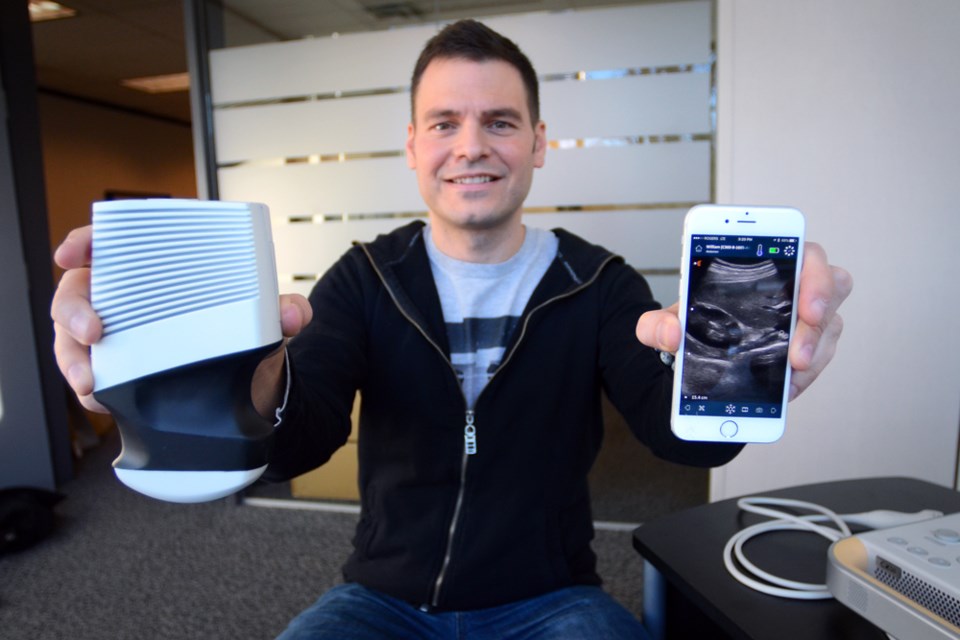After knowing him for only a few minutes, Clarius Mobile Health CEO Laurent Pelissier shows me parts of himself I never expected to see.
Using his Burnaby company’s new handheld C3 ultrasound scanner and his iPhone, the 45-year-old entrepreneurial electrical engineer lets me peer at his liver, one of his kidneys, his gall bladder and his diaphragm.
Slipping the scanner under his shirt, Pelissier slides it around on his abdomen, and writhing black and white images appear on his cell phone in real time via the Clarius app.
“That’s my liver,” he says, zooming in and out with the phone’s touch screen much like you would a Facebook photo. “The grey is my liver and then the vessels are showing black because blood doesn’t reflect ultrasound … If I keep going you can see my kidney.”
The device, approved in December by Health Canada and the U.S. Food and Drug Administration for use by medical professionals, is a first of its kind, and Laurent expects it to become as ubiquitous as the stethoscope someday.
Size matters
The use of portable ultrasound scanners in so-called point-of-care settings, like doctors’ offices and emergency rooms, has become increasingly popular for things like guiding injections and scanning quickly for internal bleeding.
But even the portable devices now in use are still at least the size of a laptop computer and require doctors to mess around with cords, buttons and toggles to get usable images, Pelissier says.
Clarius scanners, meanwhile, are cordless and fit in the palm of your hand.
“We took the whole ultrasound machine and put it onto one chip and this chip we put it inside the scanner,” Pelissier says, “and for interfacing – like controlling and viewing images in real time – we use smartphones or tablets,”
Billed as the world’s first point-and-shoot ultrasound scanners, the Clarius machines have also been engineered to optimize images automatically for clinicians.
“At point-of-care, what doctors need is an ultrasound that they can place against the patient and they don’t need to fiddle around with all the buttons, so we actually have technology inside the scanner that auto-optimizes parameters,” Pelissier says.
Clarius scanners are also cheaper than existing portable devices, which cost between $25,000 and $70,000, according to Pelissier.
The price of the Burnaby-made devices ranges from $8,900 to $12,900 on the Clarius website.
Despite their user-friendly features and relatively low price, though, it turns out not just anyone can buy one of the handheld scanners to check out their own innards.
“If you’re buying one to use yourself, we wouldn’t be able to sell it to you,” Pelissier says. “That’s medical-device regulations. It’s still a prescription device.”
Market ready
The cutting edge, hand-held Clarius scanners are the product of two years of aggressive research and development by a team of engineers with lots of experience in ultrasound technology, according to the founder and CEO, and the company is now launching into its commercial phase.
“The result of FDA and Health Canada approval is that we’re going to ramp up sales and ramp up activity,” says Pelissier, who has worked in the industry for more than 20 years and is also the founder of Ultrasonix Medical, a Richmond-based company acquired by an American firm four-and-a-half years ago.
Clarius, which currently employs 60 people at its Gilmore Way facility, expects to double its workforce by the end of the year.
“We’re going to continue growing the company here,” Pelissier says.



